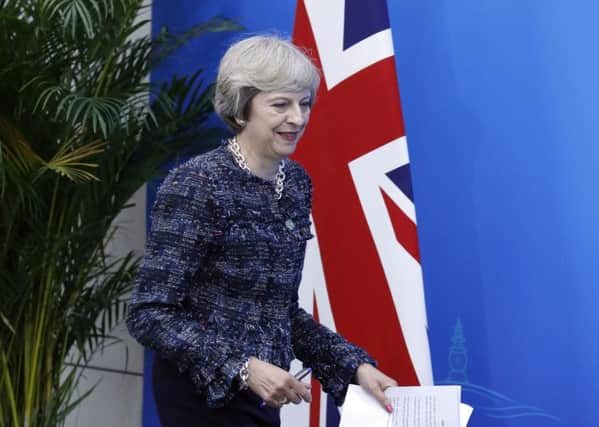Bernard Ingham: How China set the scene for Theresa May's global struggles


To clear the smog they were reported to have closed down factories within a 185-mile radius of the city for at least a week. Nearly a quarter of the 9m Hangzhouers are thought to have gone on holiday or subsidised trips. Those who remained were threatened with fines if they hung out washing on balconies in the control zone.
This and the fierce security – hotels reportedly banning people from Xinjiang, the troublesome Muslim province, Hong Kong and Taiwan – was an expensive way of trying to create an impression.
Advertisement
Hide AdAdvertisement
Hide AdChina is, of course, striving to keep its 1.3bn people happy. It also wants to be seen as a world force by, for example, breaking into the West’s nuclear development. Theresa May is disinclined to rubber stamp its involvement in the expensive French project at Hinkley Point in Somerset. At the same time, China is under global pressure over protectionism, steel dumping and, from environmentalists, its reeking atmosphere.
I doubt whether Hangzhou’s artificiality impressed the Prime Minister as she made her debut on the world’s stage while President Barack Obama bowed out. This raises the question whether the expense has been worth China’s candle.
After attending 11 successive G7 summits in the 1980s – before the concept embraced far more countries – I am hanged if I know what was achieved by them, even though their media caravans were numbered in thousands.
Margaret Thatcher and Ronald Reagan heralded more rigorous economic management in 1981 in the largest log cabin in the world at Montebello, Ottawa.
Advertisement
Hide AdAdvertisement
Hide AdBut later Reagan proved to be far less rigorous than she thought proper as the USA’s budget deficit ballooned.
Williamsburg in 1983 came in the middle of a UK election and Japan in 1986 was a hoot. First, Mrs Thatcher tried decorously at an official dinner to get her feet under a sunken dinner table and then Charles Powell, her foreign affairs private secretary, ravenous after a day’s notetaking and dictating, cooked his own meat on his personal stove and set it on fire. His personal geisha was not best pleased.
If that is all I recall of 11 G8 summits 25-35 years later, it does not say much for the institution.
But once governments start a process, it grows like Topsy. G8 began in 1975 as the G6 – a “relaxed” discussion between the leaders of France, Germany, Italy, Japan, the USA and the UK. Later Canada was admitted and then Russia – hence G8 – until it was suspended for annexing the Crimea.
Advertisement
Hide AdAdvertisement
Hide AdThat bit of dirty work did not stop Vladimir Putin going to Huangzhou for the weekend, which suggests a lack of international co-ordination, will or capitulation.
But what can you expect of the G8 countries and (in descending order of population) China, India, Indonesia, Brazil, Mexico, Turkey, South Africa, South Korea, Argentina, Saudi Arabia and Australia plus, God save us, the EU which has muscled in on these jamborees? Some of them are at each other’s throats.
Incidentally, you might wonder at the attendance of that dreaded federalist, Jean-Claude Juncker, the EU Commission president. His very presence suggests he could pledge the EU to deliver whatever was decided. What a wonderful conceit!
President Obama, bidding farewell, is credited with helping Gordon Brown to save the world from financial disaster at his first G8 summit in 2009, but not much else.
Advertisement
Hide AdAdvertisement
Hide AdThere is, however, a bonus. Theresa May has now seen the whites of world leaders’ eyes. This is more useful than you might imagine in telephonic diplomacy. She has now got a measure of them.
What really matters though is the impression she has made on them. They probably now realise that the UK breeds tough, no-nonsense women Prime Ministers who don’t mess about or play to the gallery and that this one is determined to make the UK after Brexit more rather than less valuable to this troubled world.
For the rest, it was mostly spin- doctoring.
Putin in not going to hand the Crimea back to the Ukraine. Militant Muslims won’t stop their terrorist slaughter. The great Arab/African invasion of Europe will go on. And nobody except politically correct Europeans and Americans will do much to combat climate change if it threatens their economy.
Moral: summits are mostly top show and of little substance.